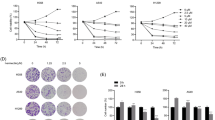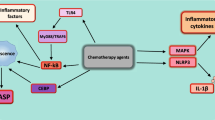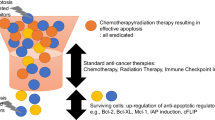Abstract
Lung cancer has second highest rate of incidence and mortality around the world. Smoking cigarettes is the main stream cause of lung carcinogenesis along with other factors such as spontaneous mutations, inactivation of tumor suppressor genes. The present study was aimed to identify the mechanistic role of Imatinib in the chemoprevention of experimental lung carcinogenesis in rat model. Gross morphological observations for tumor formation, histological examinations, RT-PCR, Western blotting, fluorescence spectroscopy and molecular docking studies were performed to elucidate the chemopreventive effects of Imatinib and support our hypothesis by various experiments. It is evident that immuno-compromised microenvironment inside solid tumors is responsible for tumor progression and drug resistance. Therefore, it is inevitable to modulate the pro-inflammatory signaling inside solid tumors to restrict neoangiogenesis. In the present study, we observed that Imatinib could downregulate the inflammatory signaling and also attributed angiostatic effects. Moreover, Imatinib also altered the biophysical properties of BAL cells such as plasma membrane potential, fluidity and microviscosity to restrict their infiltration and thereby accumulation to mount immuno-compromised environment inside the solid tumors during angiogenesis. Our molecular docking studies suggest that immunomodulatory and angiostatic properties of Imatinib could be either independent of each other or just a case of synergistic pleiotropy. Imatinib was observed to activate the intrinsic or mitochondrial pathway of apoptosis to achieve desired effects in cancer cell killings. Interestingly, binding of Imatinib inside the catalytic domain of PARP-1 also suggests that it has caspase-independent properties in promoting cancer cell deaths.








Similar content being viewed by others
References
Aggarwal BB, Shishodia S, Sandur SK, Pandey MK, Sethi G (2006) Inflammation and cancer: how hot is the link? Biochem Pharmacol 72:1605–1621. https://doi.org/10.1016/j.bcp.2006.06.029
Balkwill F, Mantovani A (2001) Inflammation and cancer: back to Virchow? Lancet 357:539–545. https://doi.org/10.1016/S0140-6736(00)04046-0
Baumber J, Meyers SA (2006) Changes in membrane lipid order with capacitation in rhesus macaque Macaca mulatta spermatozoa. J Androl 27:578–587. https://doi.org/10.2164/jandrol.05135
Bian Z, Guo Y, Ha B, Zen K, Liu Y (2012) Regulation of the inflammatory response: enhancing neutrophil infiltration under chronic inflammatory conditions. J Immunol 188:844–853. https://doi.org/10.4049/jimmunol.1101736
Boggon TJ, Li Y, Manley PW, Eck MJ (2005) Crystal structure of the Jak3 kinase domain in complex with a staurosporine analog. Blood 106:996–1002. https://doi.org/10.1182/blood-2005-02-0707
Boyde TR, Rahmatullah M (1980) Optimization of conditions for the colorimetric determination of citrulline, using diacetyl monoxime. Anal Biochem 107:424–431. https://doi.org/10.1016/0003-2697(80)90404-2
Bradford MM (1976) A rapid and sensitive method for the quantitation of microgram quantities of protein utilizing the principle of protein-dye binding. Anal Biochem 72:248–254
Chaitanya GV, Steven AJ, Babu PP (2010) PARP-1 cleavage fragments: signatures of cell-death proteases in neurodegeneration. Cell Commun Signal CCS 8:31. https://doi.org/10.1186/1478-811X-8-31
Chaput N et al (2013) Phase I clinical trial combining imatinib mesylate and IL-2: HLA-DR(+) NK cell levels correlate with disease outcome. Oncoimmunology 2:e23080. https://doi.org/10.4161/onci.23080
Chen Y et al (2011) Notch-1 signaling facilitates survivin expression in human non-small cell lung cancer cells. Cancer Biol Ther 11:14–21
Ciarcia R et al (2012) Imatinib treatment inhibit IL-6, IL-8, NF-KB and AP-1 production and modulate intracellular calcium in CML patients. J Cell Physiol 227:2798–2803. https://doi.org/10.1002/jcp.23029
Cornejo MG, Boggon TJ, Mercher T (2009) JAK3: a two-faced player in hematological disorders. Int J Biochem Cell Biol 41:2376–2379. https://doi.org/10.1016/j.biocel.2009.09.004
Cui X, Yang SC, Sharma S, Heuze-Vourc'h N, Dubinett SM (2006) IL-4 regulates COX-2 and PGE2 production in human non-small cell lung cancer. Biochem Biophys Res Commun 343:995–1001. https://doi.org/10.1016/j.bbrc.2006.03.073
Dy GK et al (2005) A phase II trial of imatinib (ST1571) in patients with c-kit expressing relapsed small-cell lung cancer: a CALGB and NCCTG study. Ann Oncol 16:1811–1816. https://doi.org/10.1093/annonc/mdi365
Eiring AM et al (2015) Combined STAT3 and BCR-ABL1 inhibition induces synthetic lethality in therapy-resistant chronic myeloid leukemia. Leukemia 29:586–597. https://doi.org/10.1038/leu.2014.245
Faber A et al (2012) Alteration of MMP-2 and -14 expression by imatinib in HPV-positive and -negative squamous cell carcinoma. Oncol Rep 28:172–178. https://doi.org/10.3892/or.2012.1766
Fan Y, Mao R, Yang J (2013) NF-kappaB and STAT3 signaling pathways collaboratively link inflammation to cancer. Protein Cell 4:176–185. https://doi.org/10.1007/s13238-013-2084-3
Friesner RA et al (2004) Glide: a new approach for rapid, accurate docking and scoring. 1 Method and assessment of docking accuracy. J Med Chem 47:1739–1749. https://doi.org/10.1021/jm0306430
Friesner RA et al (2006) Extra precision glide: docking and scoring incorporating a model of hydrophobic enclosure for protein-ligand complexes. J Med Chem 49:6177–6196. https://doi.org/10.1021/jm051256o
Fukumura D et al (2001) Predominant role of endothelial nitric oxide synthase in vascular endothelial growth factor-induced angiogenesis and vascular permeability. Proc Natl Acad Sci USA 98:2604–2609. https://doi.org/10.1073/pnas.041359198
Fumarola C, Bonelli MA, Petronini PG, Alfieri RR (2014) Targeting PI3K/AKT/mTOR pathway in non small cell lung cancer. Biochem Pharmacol 90:197–207. https://doi.org/10.1016/j.bcp.2014.05.011
Gacic J et al (2016) Imatinib reduces cholesterol uptake and matrix metalloproteinase activity in human THP-1 macrophages. Pharmacol Rep 68:1–6. https://doi.org/10.1016/j.pharep.2015.05.024
Galla HJ, Sackmann E (1974) Lateral diffusion in the hydrophobic region of membranes: use of pyrene excimers as optical probes. Biochem Biophys Acta 339:103–115
Ghosh PK, Vasanji A, Murugesan G, Eppell SJ, Graham LM, Fox PL (2002) Membrane microviscosity regulates endothelial cell motility. Nat Cell Biol 4:894–900. https://doi.org/10.1038/ncb873
Grivennikov SI, Karin M (2010) Dangerous liaisons: STAT3 and NF-kappaB collaboration and crosstalk in cancer. Cytokine Growth Factor Rev 21:11–19. https://doi.org/10.1016/j.cytogfr.2009.11.005
Hare F (1983) Simplified derivation of angular order and dynamics of rodlike fluorophores in models and membranes. Simultaneous estimation of the order and fluidity parameters for diphenylhexatriene by only coupling steady-state illumination polarization and lifetime of fluorescence. Biophys J 42:205–218. https://doi.org/10.1016/S0006-3495(83)84388-4
Hirsch FR, Lippman SM (2005) Advances in the biology of lung cancer chemoprevention. J Clin Oncol 23:3186–3197. https://doi.org/10.1200/JCO.2005.14.209
Hoeben A, Landuyt B, Highley MS, Wildiers H, Van Oosterom AT, De Bruijn EA (2004) Vascular endothelial growth factor and angiogenesis. Pharmacol Rev 56:549–580. https://doi.org/10.1124/pr.56.4.3
Jacquel A et al (2003) Imatinib induces mitochondria-dependent apoptosis of the Bcr-Abl-positive K562 cell line and its differentiation toward the erythroid lineage. FASEB J 17:2160–2162. https://doi.org/10.1096/fj.03-0322
Kaur J, Sanyal SN (2010) Alterations in membrane fluidity and dynamics in experimental colon cancer and its chemoprevention by diclofenac. Mol Cell Biochem 341:99–108. https://doi.org/10.1007/s11010-010-0441-6
Keith RL, Miller YE (2013) Lung cancer chemoprevention: current status and future prospects. Nat Rev Clin Oncol 10:334–343. https://doi.org/10.1038/nrclinonc.2013.64
Klenke FM, Gebhard MM, Ewerbeck V, Abdollahi A, Huber PE, Sckell A (2006) The selective Cox-2 inhibitor Celecoxib suppresses angiogenesis and growth of secondary bone tumors: an intravital microscopy study in mice. BMC Cancer 6:9. https://doi.org/10.1186/1471-2407-6-9
Krystal GW, Honsawek S, Litz J, Buchdunger E (2000) The selective tyrosine kinase inhibitor STI571 inhibits small cell lung cancer growth. Clin Cancer Res 6:3319–3326
Kumar K, Ghanghas P, Sanyal SN (2018) Chemopreventive action of Imatinib, a tyrosine kinase inhibitor in the regulation of angiogenesis and apoptosis in rat model of lung cancer. Mol Cell Biochem. https://doi.org/10.1007/s11010-018-3292-1
Kundu JK, Surh YJ (2008) Inflammation: gearing the journey to cancer. Mutat Res 659:15–30. https://doi.org/10.1016/j.mrrev.2008.03.002
Kurosu T, Wu N, Oshikawa G, Kagechika H, Miura O (2010) Enhancement of imatinib-induced apoptosis of BCR/ABL-expressing cells by nutlin-3 through synergistic activation of the mitochondrial apoptotic pathway. Apoptosis 15:608–620. https://doi.org/10.1007/s10495-010-0457-0
Lee SW et al (2002) Anti-inflammatory effects of IL-4 and IL-10 on human polymorphonuclear leukocytes. J Korean Me Sci 17:7–14. https://doi.org/10.3346/jkms.2002.17.1.7
Legros L, Bourcier C, Jacquel A, Mahon FX, Cassuto JP, Auberger P, Pages G (2004) Imatinib mesylate (STI571) decreases the vascular endothelial growth factor plasma concentration in patients with chronic myeloid leukemia. Blood 104:495–501. https://doi.org/10.1182/blood-2003-08-2695
Lin Q et al (2005) Constitutive activation of JAK3/STAT3 in colon carcinoma tumors and cell lines: inhibition of JAK3/STAT3 signaling induces apoptosis and cell cycle arrest of colon carcinoma cells. Am J Pathol 167:969–980. https://doi.org/10.1016/S0002-9440(10)61187-X
Litz J, Krystal GW (2006) Imatinib inhibits c-Kit-induced hypoxia-inducible factor-1alpha activity and vascular endothelial growth factor expression in small cell lung cancer cells. Mol Cancer Thera 5:1415–1422. https://doi.org/10.1158/1535-7163.MCT-05-0503
Liu W et al (2003) Cyclooxygenase-2 is up-regulated by interleukin-1 beta in human colorectal cancer cells via multiple signaling pathways. Cancer Res 63:3632–3636
Los M et al (2002) Activation and caspase-mediated inhibition of PARP: a molecular switch between fibroblast necrosis and apoptosis in death receptor signaling. Mol Biol Cell 13:978–988. https://doi.org/10.1091/mbc.01-05-0272
Lubin JH, Caporaso NE (2006) Cigarette smoking and lung cancer: modeling total exposure and intensity. Cancer Epidemiol Biomark Prev 15:517–523. https://doi.org/10.1158/1055-9965.EPI-05-0863
Luo X et al (2004) Intratumoral expression of MIP-1beta induces antitumor responses in a pre-established tumor model through chemoattracting T cells and NK cells. Cell Mol Immunol 1:199–204
Mignot G et al (2008) The critical role of IL-15 in the antitumor effects mediated by the combination therapy imatinib and IL-2. J Immunol 180:6477–6483
Moehring A, Wohlbold L, Aulitzky WE, van der Kuip H (2005) Role of poly(ADP-ribose) polymerase activity in imatinib mesylate-induced cell death. Cell Death Differ 12:627–636. https://doi.org/10.1038/sj.cdd.4401608
Nadda N, Vaish V, Setia S, Sanyal SN (2012) Angiostatic role of the selective cyclooxygenase-2 inhibitor etoricoxib (MK0663) in experimental lung cancer biomedicine and pharmacotherapy. Biomed Pharmacother 66:474–483. https://doi.org/10.1016/j.biopha.2012.04.002
Nadda N, Setia S, Vaish V, Sanyal SN (2013) Role of cytokines in experimentally induced lung cancer and chemoprevention by COX-2 selective inhibitor, etoricoxib. Mol Cell Biochem 372:101–112. https://doi.org/10.1007/s11010-012-1451-3
Nair RR, Tolentino JH, Hazlehurst LA (2012) Role of STAT3 in transformation and drug resistance in CML. Front Oncol 2:30. https://doi.org/10.3389/fonc.2012.00030
Okada M et al (2004) A novel mechanism for imatinib mesylate-induced cell death of BCR-ABL-positive human leukemic cells: caspase-independent, necrosis-like programmed cell death mediated by serine protease activity. Blood 103:2299–2307. https://doi.org/10.1182/blood-2003-05-1605
Page-McCaw A, Ewald AJ, Werb Z (2007) Matrix metalloproteinases and the regulation of tissue remodelling. Nat Rev Mol Cell Biol 8:221–233. https://doi.org/10.1038/nrm2125
Pautier P et al (2013) Phase I clinical trial combining imatinib mesylate and IL-2 in refractory cancer patients: IL-2 interferes with the pharmacokinetics of imatinib mesylate. Oncoimmunology 2:e23079. https://doi.org/10.4161/onci.23079
Piccagli L et al (2008) Docking of molecules identified in bioactive medicinal plants extracts into the p50 NF-kappaB transcription factor: correlation with inhibition of NF-kappaB/DNA interactions and inhibitory effects on IL-8 gene expression. BMC Struct Biol 8:38. https://doi.org/10.1186/1472-6807-8-38
Pottel vdMW H, Herreman W (1983) Correlation between the order parameter and the steady-state fluorescence anisotropy of 1,6-diphenyl-1,3,5-hexatriene and an evaluation of membrane fluidity. Biochimica et Biophysica Acta (BBA). Biomembranes 730:181–186. https://doi.org/10.1016/0005-2736(83)90331-0
Rapovy SM, Zhao J, Bricker RL, Schmidt SM, Setchell KD, Qualls JE (2015) Differential Requirements for L-Citrulline and L-Arginine during Antimycobacterial Macrophage Activity. J Immunol 195:3293–3300. https://doi.org/10.4049/jimmunol.1500800
Rizzo AN, Sammani S, Esquinca AE, Jacobson JR, Garcia JG, Letsiou E, Dudek SM (2015) Imatinib attenuates inflammation and vascular leak in a clinically relevant two-hit model of acute lung injury. Am J Physiol Lung Cell Mol Physiol 309:L1294–1304. https://doi.org/10.1152/ajplung.00031.2015
Ruf A, de Murcia G, Schulz GE (1998) Inhibitor and NAD+ binding to poly(ADP-ribose) polymerase as derived from crystal structures and homology modeling. Biochemistry 37:3893–3900. https://doi.org/10.1021/bi972383s
Saini RK, Sanyal SN (2008) Pulmonary carcinogenesis in mice with a single intratracheal instillation of 9, 10-dimethyl benz[a]anthracene. Drug Chem Toxicol 31:459–471. https://doi.org/10.1080/01480540802390544
Sang QX (1998) Complex role of matrix metalloproteinases in angiogenesis. Cell Res 8:171–177. https://doi.org/10.1038/cr.1998.17
Schultz JD et al (2011a) Down-regulation of MMP-2 expression due to inhibition of receptor tyrosine kinases by imatinib and carboplatin in HNSCC. Oncol Rep 25:1145–1151. https://doi.org/10.3892/or.2011.1153
Schultz JD et al (2011b) Chemotherapeutic alteration of VEGF-/PDGF- and PDGF-Ralpha/beta expression by imatinib in HPV-transformed squamous cell carcinoma compared to HPV-negative HNSCC in vitro. Oncol Rep 26:1099–1109. https://doi.org/10.3892/or.2011.1403
Setia S, Vaish V, Sanyal SN (2012) Chemopreventive effects of NSAIDs as inhibitors of cyclooxygenase-2 and inducers of apoptosis in experimental lung carcinogenesis. Mol Cell Biochem 366:89–99. https://doi.org/10.1007/s11010-012-1286-y
Shankaranarayanan P, Nigam S (2003) IL-4 induces apoptosis in A549 lung adenocarcinoma cells: evidence for the pivotal role of 15-hydroxyeicosatetraenoic acid binding to activated peroxisome proliferator-activated receptor gamma transcription factor. J Immunol 170:887–894
Shao S, Yu R, Yu Y, Li Y (2014) Dual-inhibitors of STAT5 and STAT3: studies from molecular docking and molecular dynamics simulations. J Mol Model 20:2399. https://doi.org/10.1007/s00894-014-2399-x
Shinitzky M, Barenholz Y (1974) Dynamics of the hydrocarbon layer in liposomes of lecithin and sphingomyelin containing dicetylphosphate. J Biol Chem 249:2652–2657
Siboni G, Rothmann C, Ehrenberg B, Malik Z (2001) Spectral imaging of MC540 during murine and human colon carcinoma cell differentiation. J Histochem Cytochem 49:147–153. https://doi.org/10.1177/002215540104900202
Singh Kanwar S, Vaish V, Nath Sanyal S (2011) Altered membrane lipid dynamics and chemoprevention by non-steroidal anti inflammatory drugs during colon carcinogenesis. Nutr Hosp 26:1141–1154. https://doi.org/10.1590/S0212-16112011000500034
Sola-Villa D, Camacho M, Sola R, Soler M, Diaz JM, Vila L (2006) IL-1beta induces VEGF, independently of PGE2 induction, mainly through the PI3-K/mTOR pathway in renal mesangial cells. Kidney Int 70:1935–1941. https://doi.org/10.1038/sj.ki.5001948
Song ZJ, Gong P, Wu YE (2002) Relationship between the expression of iNOS VEGF, tumor angiogenesis and gastric cancer. World J Gastroenterol 8:591–595
Soria JC, Johnson BE, Chevalier TL (2003a) Imatinib in small cell lung cancer. Lung Cancer 41(Suppl 1):S49–53
Soria JC, Kim ES, Fayette J, Lantuejoul S, Deutsch E, Hong WK (2003b) Chemoprevention of lung cancer. Lancet Oncol 4:659–669
Sporn MB (1976) Approaches to prevention of epithelial cancer during the preneoplastic period. Can Res 36:2699–2702
Stahtea XN et al (2007) Imatinib inhibits colorectal cancer cell growth and suppresses stromal-induced growth stimulation, MT1-MMP expression and pro-MMP2 activation. Int J Cancer 121:2808–2814. https://doi.org/10.1002/ijc.23029
Sternlicht MD, Werb Z (2001) How matrix metalloproteinases regulate cell behavior. Annu Rev Cell Dev Biol 17:463–516. https://doi.org/10.1146/annurev.cellbio.17.1.463
Stuehr DJ, Marletta MA (1987) Synthesis of nitrite and nitrate in murine macrophage cell lines. Can Res 47:5590–5594
Taieb J et al (2006) A novel dendritic cell subset involved in tumor immunosurveillance. Nat Med 12:214–219. https://doi.org/10.1038/nm1356
Tazzyman S, Barry ST, Ashton S, Wood P, Blakey D, Lewis CE, Murdoch C (2011) Inhibition of neutrophil infiltration into A549 lung tumors in vitro and in vivo using a CXCR2-specific antagonist is associated with reduced tumor growth. Int J Cancer 129:847–858. https://doi.org/10.1002/ijc.25987
Vaish V, Sanyal SN (2011a) Chemopreventive effects of NSAIDs on cytokines and transcription factors during the early stages of colorectal cancer. Pharmacol Rep 63:1210–1221
Vaish V, Sanyal SN (2011b) Non steroidal anti-inflammatory drugs modulate the physicochemical properties of plasma membrane in experimental colorectal cancer: a fluorescence spectroscopic study. Mol Cell Biochem 358:161–171. https://doi.org/10.1007/s11010-011-0931-1
Vaish V, Sanyal SN (2012a) Role of Sulindac and Celecoxib in chemoprevention of colorectal cancer via intrinsic pathway of apoptosis: exploring NHE-1, intracellular calcium homeostasis and Calpain 9. Biomed Pharmacother 66:116–130. https://doi.org/10.1016/j.biopha.2011.11.019
Vaish V, Sanyal SN (2012b) Role of Sulindac and Celecoxib in the regulation of angiogenesis during the early neoplasm of colon: exploring PI3-K/PTEN/Akt pathway to the canonical Wnt/beta-catenin signaling. Biomed Pharmacother 66:354–367. https://doi.org/10.1016/j.biopha.2012.01.004
Vaish V, Piplani H, Rana C, Sanyal SN (2013a) Angiostatic properties of sulindac and celecoxib in the experimentally induced inflammatory colorectal cancer. Cell Biochem Biophys 66:205–227. https://doi.org/10.1007/s12013-012-9469-4
Vaish V, Piplani H, Rana C, Vaiphei K, Sanyal SN (2013b) NSAIDs may regulate EGR-1-mediated induction of reactive oxygen species and non-steroidal anti-inflammatory drug-induced gene (NAG)-1 to initiate intrinsic pathway of apoptosis for the chemoprevention of colorectal cancer. Mol Cell Biochem 378:47–64. https://doi.org/10.1007/s11010-013-1593-y
van Zandwijk N, Hirsch FR (2003) Chemoprevention of lung cancer: current status and future prospects. Lung Cancer 42(Suppl 1):S71–79
Vanderkooi JM, Callis JB (1974) Pyrene A probe of lateral diffusion in the hydrophobic region of membranes. Biochemistry 13:4000–4006. https://doi.org/10.1021/bi00716a028
Vlahovic G, Rabbani ZN, Herndon JE 2nd, Dewhirst MW, Vujaskovic Z (2006) Treatment with Imatinib in NSCLC is associated with decrease of phosphorylated PDGFR-beta and VEGF expression, decrease in interstitial fluid pressure and improvement of oxygenation British. J Cancer 95:1013–1019. https://doi.org/10.1038/sj.bjc.6603366
Vlahovic G et al (2007) Treatment with imatinib improves drug delivery and efficacy in NSCLC xenografts. Br J Cancer 97:735–740. https://doi.org/10.1038/sj.bjc.6603941
Wang WL et al (2000) Growth inhibition and modulation of kinase pathways of small cell lung cancer cell lines by the novel tyrosine kinase inhibitor STI 571. Oncogene 19:3521–3528. https://doi.org/10.1038/sj.onc.1203698
Wang Y et al (2013) Mechanism of the inhibition of the STAT3 signaling pathway by EGCG. Oncol Rep 30:2691–2696. https://doi.org/10.3892/or.2013.2743
Wileman SM, Mann GE, Pearson JD, Baydoun AR (2003) Role of L-citrulline transport in nitric oxide synthesis in rat aortic smooth muscle cells activated with LPS and interferon-gamma. Br J Pharmacol 140:179–185. https://doi.org/10.1038/sj.bjp.0705407
Winterhalder RC, Hirsch FR, Kotantoulas GK, Franklin WA, Bunn PA Jr (2004) Chemoprevention of lung cancer–from biology to clinical reality. Ann Oncol 15:185–196
Wolf AM et al. (2005) The kinase inhibitor imatinib mesylate inhibits TNF-{alpha} production in vitro and prevents TNF-dependent acute hepatic inflammation Proceedings of the National Academy of Sciences of the United States of America 102:13622–13627 doi:10.1073/pnas.0501758102
Yagi K, Shimada A, Sendo T (2018) Pharmacological inhibition of JAK3 enhances the antitumor activity of imatinib in human chronic myeloid leukemia. Eur J Pharmacol 825:28–33. https://doi.org/10.1016/j.ejphar.2018.02.022
Zhang T, Kee WH, Seow KT, Fung W, Cao X (2000) The coiled-coil domain of Stat3 is essential for its SH2 domain-mediated receptor binding and subsequent activation induced by epidermal growth factor and interleukin-6. Mol Cell Biol 20:7132–7139
Zhang P, Gao WY, Turner S, Ducatman BS (2003) Gleevec (STI-571) inhibits lung cancer cell growth (A549) and potentiates the cisplatin effect in vitro. Mol Cancer 2:1
Funding
No funds were received from any National or International Agency for this study.
Author information
Authors and Affiliations
Contributions
SNS and VV conceived the study and defined the aims and objectives. SP, GK and VV performed the animal procedures and other experiments. HP contributed in molecular docking studies. SNS and VV analyzed the data and statistics. VV wrote the manuscript.
Corresponding author
Ethics declarations
Conflict of interest
The authors declare no conflict of interest.
Additional information
Publisher's Note
Springer Nature remains neutral with regard to jurisdictional claims in published maps and institutional affiliations.
Electronic supplementary material
Below is the link to the electronic supplementary material.
Rights and permissions
About this article
Cite this article
Puri, S., Kaur, G., Piplani, H. et al. Imatinib modulates pro-inflammatory microenvironment with angiostatic effects in experimental lung carcinogenesis. Inflammopharmacol 28, 231–252 (2020). https://doi.org/10.1007/s10787-019-00656-8
Received:
Accepted:
Published:
Issue Date:
DOI: https://doi.org/10.1007/s10787-019-00656-8




